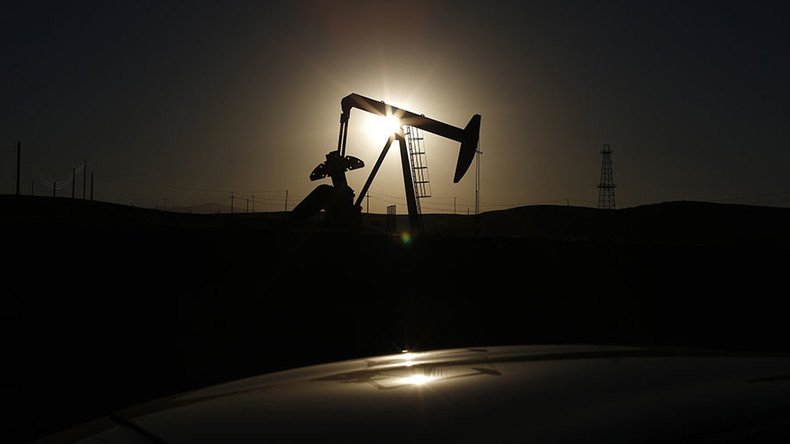‘Biggest bribery scandal’: US, UK, Australia launch probe into mass oil industry corruption

An investigation into a massive global oil bribery scandal has been launched by authorities in the US, Britain, and Australia, after leaked confidential files indicated that some of the world’s most powerful corporations were part of the racket.
The global investigation by authorities comes after the biggest leak of confidential files in the history of the oil industry, obtained by The Huffington Post, unveiled widespread corruption taking place in oil-rich countries. The US Department of Justice, FBI, UK National Crime Agency and Australian Federal Police are now jointly investigating the allegations in what could become the world’s biggest probe into corruption allegations.
The scandal is being revealed in a three-part series titled The Bribe Factory, which is the result of a six-month investigation by The Huffington Post and Australia's Fairfax Media.
The report’s first release disclosed apparent dodgy dealings in the Middle East and North Africa. The second will focus on alleged corruption in former Soviet states, and the final will focus on Asia and Africa.
Citing the trove of leaked documents, the report has revealed that government contracts worth billions of dollars were awarded on the basis of bribes, many of which were organized by a 'fixer' company known as Unaoil.
Leaked emails reveal a global bribery scandal involving oil industry giant #Unaoilhttps://t.co/umcICxw2ua
— Huffington Post (@HuffingtonPost) March 30, 2016
Although many outside the oil industry have never heard of Unaoil, it has allegedly been participating in major illegal deals behind the scenes, convincing Western corporations that they will not be able to get contracts in oil-rich countries without its help.
The company stands accused of portraying itself as a lobbyist and charging major companies multi-million dollar fees in exchange for bribing government officials in order to get good deals for the corporations. According to the leaked documents, major international companies across the US, Europe, Asia, and Australia have taken part in dealings with Unaoil.
But Unaoil wasn’t the only party at fault. The documents imply that many of the corporations could have known exactly what was happening.
Among the biggest names implicated are Samsung; Hyundai; US weapons corporation Halliburton and its former subsidiary Kellogg, Brown & Root; Texas firm National Oilwell Varco; Singapore conglomerate Keppel; Norway’s Aker Kvaerner; Turkish joint venture GATE; and Italian oil giant Eni.
The information obtained by the publications includes hundreds of thousands of emails to Unaoil’s chief executive, Cyrus Ahsani, which show that managers and executives from Halliburton and Kellogg Brown & Root, which split in 2007, knew or at least suspected that Unaoil was acting illegally to win contracts in Kazakhstan.
Meanwhile, managers from Eni, Spanish firm Tecnicas Reunidas, French firm Technip, drilling giant MI-SWACO, and Rolls-Royce are shown to have actively supported bribery and were offered – or pocketed – their own kickbacks.
In addition, US defense giant Honeywell and Australian firm Leighton Offshore agreed to hide bribes inside fraudulent contracts in Iraq.
Until the moment Fairfax Media and The Huffington Post hit the publish button at 10pm on Wednesday, AEDT, our... https://t.co/7TPxtBW0qs
— The WikiLeaks Party (@WikiLeaksParty) March 31, 2016
When approached by The Huffington Post and Fairfax Media, the implicated companies emphasized their anti-corruption policies and said they were committed to investigating their dealings with Unaoil.
Unaoil – which is incorporated in Monaco but based in the British Virgin Islands – has denied taking part in any corruption. However, the investigation's reporters paint a very different picture of Unaoil, saying it has “almost perfected the art of corruption.”
“The trove reveals how they rub shoulders with royalty, party in style, mock anti-corruption agencies, and operate a secret network of fixers and middlemen throughout the world's oil producing nations,” the reporters wrote.
Aiding corruption & creating political instability in the Middle East
In the first portion of the investigation released to the public, the reporters stated that western companies worked with Iraq’s “new elite” to begin a “sustained campaign of looting.”
“Unaoil paid at least $25 million in bribes via middlemen to secure the support of powerful officials – while complaining internally that they were ‘a**holes, and greedy,’” the report states.
It goes on to state that government officials got large kickbacks and that Unaoil “influenced a Who's Who of the country’s oil industry” from 2004 to 2012, from the deputy prime minister to the oil minister and beyond.
The corruption also trickled over to neighboring Iran, with corporations working with government officials to make large deals.
The Bribe Factory: How western multi-nationals from Rolls-Royce to Halliburton to bribed the world's governments https://t.co/WxF9zTR7wr
— WikiLeaks (@wikileaks) March 30, 2016
The report goes on to cover Unaoil’s dealings in North Africa, alleging that before the overthrow of the Libyan government in 2011, Unaoil made dodgy deals with officials, guaranteeing oil and gas contracts for multi-national corporations.
The report also states that similar dealings took place in Syria, with Unaoil helping British oil company Petrofac secure deals with the government.
Unaoil also had a large presence in the Gulf states, working with governments to strike lucrative contracts. The emails indicated that the company bribed a powerful official referred to as “The Big Cheese” in Kuwait. In the United Arab Emirates, it apparently worked with official with links to the Crown Prince of Abu Dhabi. Dodgy dealings were also reported in Yemen.
The report alleges that Unaoil's dealings have done far more damage than simply breaking laws. By fueling corruption the company was also “creating political instability, turning citizens against their own governments, and fueling the rage that would erupt during the Arab Spring – and be exploited by terrorist groups like Al-Qaeda and the Islamic State (IS, formerly ISIS/ISIL).”












